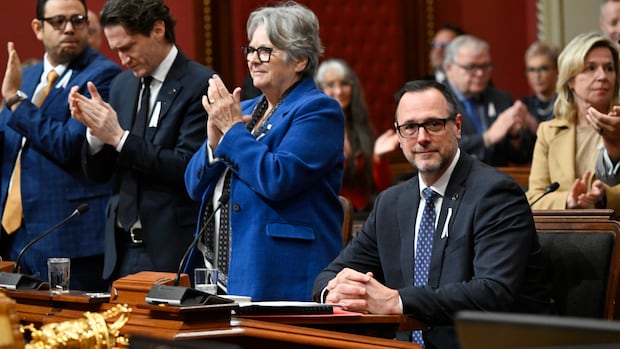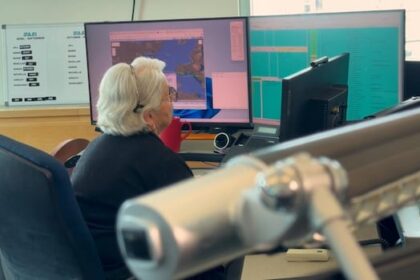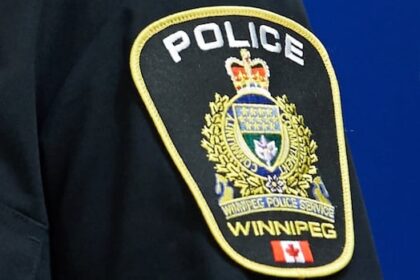MontrealThe Quebec government wants to place limits on praying in public and extend a ban on wearing religious symbols to daycare workers as part of a sweeping new secularism bill tabled Thursday.CAQ government aims to further expand secularism lawsBenjamin Shingler · CBC News · Posted: Nov 27, 2025 4:00 AM EST | Last Updated: 1 hour agoListen to this articleEstimated 5 minutesThe audio version of this article is generated by text-to-speech, a technology based on artificial intelligence.Jean-François Roberge, right, Quebec’s minister responsible for secularism, tabled a bill aimed at strengthening secularism on Thursday. (Jacques Boissinot/The Canadian Press)The Quebec government wants to place limits on praying in public and extend a ban on wearing religious symbols to daycare workers as part of a sweeping new secularism bill tabled Thursday.Bill 9, titled An Act respecting the reinforcement of laicity in Quebec, sets out to build on two previous secularism laws passed under Premier François Legault.Jean-François Roberge, Quebec’s minister responsible for secularism, said the bill is part of the government’s longstanding goal of ensuring the “religious neutrality of the state” and “equality for all citizens.””We think that when the state is neutral, Quebecers are free,” Roberge said at a news conference Thursday. Roberge rejected a suggestion from a reporter that religious minorities were unfairly targeted with Bill 9.”We have the same rules applying to everyone,” he said. The proposed changes include:Banning subsidized daycare and private school workers from wearing religious symbols, such as a hijab or kippa (with a clause exempting those already in their position).Prohibiting public institutions, such as hospitals, from only offering food based on a religious tradition, such as halal or kosher meals. Roberge said other meals would need to be offered as well.Phasing out public subsidies for religious private schools that select students or staff based on religious affiliation, or that teach religious content.Banning prayer spaces in public institutions including universities, as well as group prayers in public spaces such as parks without municipal authorization. Universities are “not a temple or a church,” Roberge said.Expanding the requirement to have an uncovered face at all times to anyone present in a public education setting.The bill also invokes the notwithstanding clause pre-emptively, shielding it from challenges under the Canadian Charter of Rights and Freedoms. WATCH | A history of secularism in Quebec:Why secularism is still such a big issue in Quebec politicsFor the last 20 years, one issue has kept resurfacing in Quebec politics. It’s not language or separatism, but the relationship between Quebec society and religion — often one religion in particular.The legislation is the latest tabled by Legault’s Coalition Avenir Québec government, which has been slumping in opinion polls ahead of next year’s provincial election.In October, the government adopted a law banning religious symbols worn by any school employee who interacts with a student.That law was itself an expansion of a 2019 law, known as Bill 21, that banned religious symbols worn by public employees deemed to be in positions of authority, including teachers, judges and police officers. The government also passed a bill earlier this year requiring immigrants to embrace the common culture of the province. The Parti Québécois, which has been leading in the polls for two years, has been calling for the government to reinforce its secularism laws. On Thursday, PQ Leader Paul St-Pierre Plamondon said Bill 9 was not well thought out, but he agreed with the overall goal.”It’s a very legitimate subject, and I think social peace will be better served by putting limits to what religion can dictate to others,” he said at a news conference.An attack for political gain, critics sayBill 9 was criticized by religious groups and civil liberties advocates even before it was tabled as an attack on minorities for political gain.Stephen Brown, president of the National Council of Canadian Muslims, said it amounts to “political opportunism” and serves as a distraction from other pressing issues, including a conflict with the province’s doctors and a shortage of affordable housing.”Unfortunately, once again, it’s the same group of minorities that are serving as the foil,” he said. In a statement, the Assembly of Catholic Bishops of Quebec said the proposed bill would be a “radical infringement on the rights and freedoms of the Quebec population” and that “the government has not demonstrated the need for such legislation.”Maria English, executive director of a public daycare with five locations and more than 300 children, said the new rules for daycares would disproportionately target Muslim women and make it harder for her to find workers.”A religious symbol does not determine how you will be with the children, so it will take away some very nurturing educators,” English said.Mohamed-Amine Benzaid, a computer engineering student at McGill University and a member of the Muslim Student Association, said he uses a prayer room on campus on a daily basis. He’s concerned he could lose that access if the legislation passes.”It does help me with my studies,” he said. “With exams, with classes, you feel overwhelmed. And every time I go to the prayer room, I do my prayers, I get outside and I’m fresh to go back and study and give more to my community.”Earlier this year, Christiane Pelchat co-authored a government-commissioned report looking at ways to strengthen secularism in the province. Bill 9 follows through on several recommendations, including the ban on religious symbols among subsidized daycare workers. In an interview, Pelchat said the secularism laws are part of a long-running effort to separate religion from the state, rooted in the break with the Catholic Church during Quebec’s Quiet Revolution. “This is something my fellow anglophone people — friends — they don’t always get that,” she said.ABOUT THE AUTHORBenjamin Shingler is a reporter based in Montreal covering social issues and Quebec politics. He previously worked at The Canadian Press and the New Brunswick Telegraph-Journal, and is an alumnus of the Oxford Climate Journalism Network.With files from Sarah Leavitt and Cathy Senay
Thursday, 5 Mar 2026
Canada – The Illusion
Search
Have an existing account?
Sign In
© 2022 Foxiz News Network. Ruby Design Company. All Rights Reserved.
You May also Like
- More News:
- history
- Standing Bear Network
- John Gonzalez
- ᐊᔭᐦᑊ ayahp — It happened
- Creation
- Beneath the Water
- Olympic gold medal
- Jim Thorpe
- type O blood
- the bringer of life
- Raven
- Wás’agi
- NoiseCat
- 'Sugarcane'
- The rivers still sing
- ᑲᓂᐸᐏᐟ ᒪᐢᑿ
- ᐅᑳᐤ okâw — We remember
- ᐊᓂᓈᐯᐃᐧᐣ aninâpêwin — Truth
- This is what it means to be human.
- Nokoma











